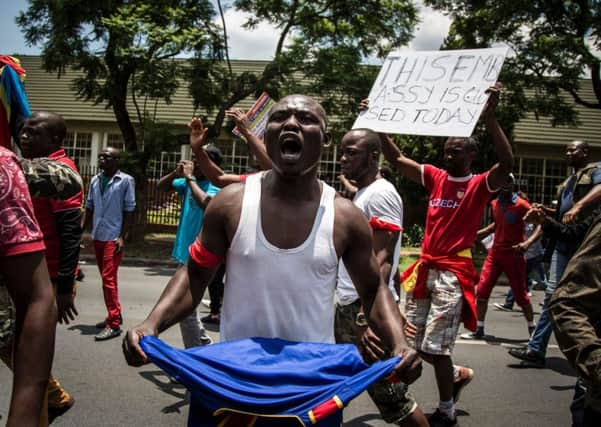At least 26 killed in Congo protests as crisis talks resume


Security forces in Congo have killed at least 26 demonstrators and arrested scores more amid protests against president Joseph Kabila’s hold on power, Human Rights Watch said, as talks on the crisis caused by delayed elections resumed yesterday under Catholic church mediators.
Pope Francis urged calm during his weekly address, saying: “I renew my heartfelt appeal to all Congolese so that in this delicate moment of their history, they may be artisans of reconciliation and peace.”
Advertisement
Hide AdAdvertisement
Hide AdA heavy military and police presence remained in the capital, Kinshasa, and across the country. The remains of barricades littered the streets after protesters burned the headquarters of the ruling party on Tuesday, the first day after Mr Kabila’s mandate expired.
Reports of the death toll varied. Yesterday, the UN peacekeeping mission in Congo said it had documented 19 people shot to death, 45 wounded and a “very high number” of arrests in Kinshasa, Lubumbashi, Matadi and Goma. The UN has recorded 113 arrests across the country since Friday, including opposition members and activists.
Congo’s government said nine people had been killed in the capital: a police officer, two women hit by stray bullets and six men killed in looting.
“The opposition wanted to demonstrate to take power by force. What kind of state would not defend itself against such behaviour?” said Jean-Pierre Kambila, Mr Kabila’s Cabinet director. “We had to deter people from demonstrating, otherwise there would have been deaths like in September.”
Dozens were killed in the September protests when the electoral commission failed to schedule the presidential election. Once set for November, it has now been indefinitely delayed. The ruling party says it will not be held until 2018.
Kabila, who took office in 2001 after his father’s assassination, is constitutionally barred from seeking another term, but a court has ruled that he can remain in power until the new elections.
Political talks between the ruling party and opposition, which stalled over the weekend, resumed Wednesday with mediators from the Catholic church. The main opposition coalition confirmed its participation. Issues include scheduling the elections and releasing political prisoners.
The political impasse has fuelled fears of widespread unrest in this vast Central African nation that has trillions of dollars’ worth of natural resources but remains one of the world’s poorest and most unstable countries.